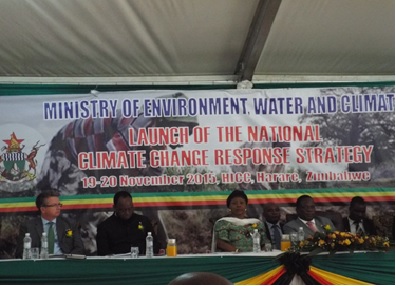The main objectives of the workshop included; bringing together stakeholders to discuss Zimbabwe’s common position on climate change that will be incorporated into the African position to be endorsed at the 21st Conference of Parties (COP 21) in France from 30 November to 11 December, to raise awareness and discuss the key aspects of the draft 2020 climate agreement, to formally launch the NCCRS and to get contributions from various stakeholder groups to be included in the draft National Climate Change Policy.
In his key note address at the official launch of the NCCRS, the Vice President, Emmerson Mnangagwa, noted that the Government remains committed to mobilise finances for climate change projects mainly in rural areas. He challenged traditional chiefs, who are the custodians of the 70 percent of the country's population, to protect the environment by making sure communities desist from cutting down trees, river bank cultivation and starting veld fires. He further added that climate change awareness should be mainstreamed into the education sector with educators being adequately trained.
Speaking at the launch, Environment, Water and Climate Minister, Cde Oppah Muchinguri-Kashiri noted that low rainfall patterns experienced over the years have caused the depletion of water bodies in the region, threatening electric energy generation and impacting negatively on food security. She added that, "the government will ensure the National Climate Change Response Strategy is implemented to benefit a number of communities.”
Day one of the conference had presentations on climate change issues in Zimbabwe, weather and climate, early warning systems and the 2015/2016 rainfall season, perspective of climate change on agriculture. During the afternoon session there were presentations and discussions on the draft National Climate Policy. On the second day, participants were divided into five groups that comprised of; local authorities, energy and mitigation, implementation, wildlife and forestry and COP 21. The aim was for the groups to discuss different components that had to be incorporated into the COP 21 discussions on Zimbabwe’s position on climate change issues.
Read more:
Climate change strategy launched, ZBC online, 19 November 2015
Mnangagwa challenges country on climate change, NewsDay, 20 November 2015
